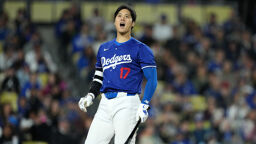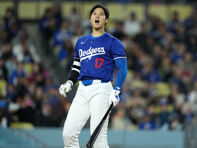Major League Baseball ended its regular season on Sunday after a COVID-shortened 60 games and for the first time since the 2016 season, there were no players involved in any recorded, on-field anti-gay controversies.
Granted, the season was 102 games shorter than normal and we still have the playoffs to go, but it’s refreshing nonetheless that we heard no mentions of players using gay slurs.
The only incident of note came in August, when longtime Cincinnati Reds announced Thom Brennaman used a gay slur over a hot mic. The slur got Brennaman suspended (he resigned last week) and it also cost him his NFL announcing gig. It also showed that several Reds players and manager David Bell had no tolerance for homophobia and was a positive sign of growth in the sport toward gay players.
Relief pitchers Matt Bowen and Amir Garrett immediately took to Twitter to denounce the remarks and support the LGBTQ community, with Garrett tweeting: “To the LGBTQ community just know I am with you, and whoever is against you, is against me. I’m sorry for what was said today.”
Longtime Reds star Joey Votto was very expansive in his reaction, saying, “I was saddened by it. Certainly, that’s something that was associated with our organization, and it’s a bummer. It’s too bad that there are people out there that have been held down and oppressed and had terrible experiences in their lives in association of that word, because of that word.
“From our perspective, and I’m always wary of speaking on things like this because I’m not a perfect person and nobody inside of our workspace is, but it’s important that it’s acknowledged that is wrong, and lots of people probably felt pain that they’ve experienced in the past reignited when they heard that word over just a ballgame. They were just trying to tune in to watch a ballgame, support their local team, or support a team that they … they just wanted to watch a baseball game, and something like that was brought up.”
In a deep-dive in The Athletic, titled ‘We’ve been here before’: Examining MLB’s relationship with the LGBTQ+ community,” reporters Brittany Ghiroli and C. Trent Rosecrans use the Brennaman incident to examine how MLB treats LGBTQ issues and whether the sport is ready for an openly gay player (There has never been an out active bi or gay MLB player). Bowman and Garrett discussed in greater detail why they reacted so quickly to the slur.
“A lot of people, they feel like they can’t be themselves around others. They feel like they’re not wanted in sports, either,” said Garrett, who has also been active in speaking up in the Black Lives Matter movement. “I’d be a hypocrite to fight for one belief and not fight for them, because they want to be comfortable in their own skin as well. So I just felt like, [I] have to speak up for them, [and] I would have to apologize to them, as well.”
Bowman admitted he might not have said anything had he played for another team, but felt it was important since Brennaman was the public voice of the Reds.
“It seemed very alienating, so I thought that someone else who is from the Reds organization and who people are closely associated with the Reds could say something supportive just to let everyone know that this is not representative of the organization,” Bowman said.
To players like Sean Doolittle of the Washington Nationals, long an advocate for LGBTQ issues, the reactions to Brennaman showed that players are evolving. “My experience as a player, I really think is changing,” Doolittle said. “The outrage response [to Brennaman’s slur] is evidence it is changing.”
Doolittle recounted an incident last year in Philadelphia, when a fan called him a “fag” repeatedly while he was warming up in the bullpen. His teammates immediately confronted the fan, called security and had him ejected from the stadium. “They knew, even as far as a fan heckling, there is no room for that in our game at the ballpark,” Doolittle said. “I thought that was awesome.”
If you have a subscription, The Athletic article is worth your time. While it doesn’t break new ground, it does show that, in fits and starts, MLB is making progress toward being a more inclusive environment. It gives hope that should a player ever decide to come out publicly, most, if not all, of his teammates would have his back.







































